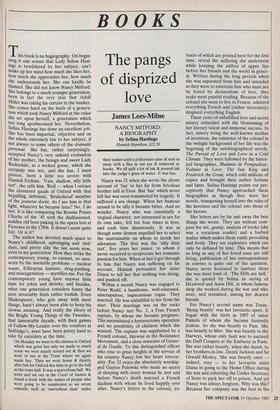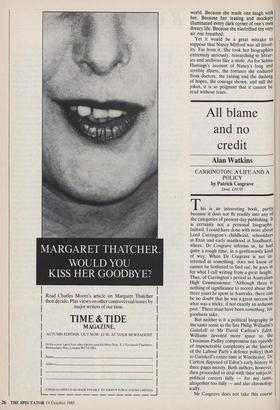BOOKS
The pangs of disprized love
James Lees-Milne
NANCY MITFORD: A BIOGRAPHY by Selina Hastings Hamish Hamilton, £12.50 This book is no hagiography. On begin- ning it one senses that Lady Selina Hast- ings is bewildered by her subject, can't make up her mind how much she likes her, how much she appreciates her, how much she understands her. She can hardly be blamed. She did not know Nancy Mitford. She belongs to a much younger generation, born in fact the very year that Adolf Hitler was taking his curtain in the bunker. She comes hard on the heels of a genera- tion which took Nancy Mitford at the value she set upon herself, a generation which too long apotheosised her. Nevertheless, Selina Hastings has done an excellent job. She has been impartial, objective and on the whole extremely fair to her subject, if not always to some others of the dramatis personae. She has, rather surprisingly, accepted Nancy's very unkind evaluation of her mother, the benign and sweet Lady Redesdale, as a wicked goose, which she certainly was not, and she has, I must protest, been a little too severe with Hamish Erskine. 'Vain, shallow, silly little tart', she calls him. Well — when I retrace the cloistered quads of Oxford with that beguiling, debonair, 'Brideshead' member of the jeunesse doree, do I see him in that light, whatever he became later? No, I do not. It is like comparing the Bonnie Prince Charlie of the '45 with the disillusioned, sodden old bore puking in the opera box at Florence in the 1780s. It doesn't seem quite fair. Or is it?
The author has devoted much space to Nancy's childhood, upbringing and 'deb' days, and pretty silly the last seem now, even to my generation. How they strike the contemporary young, so earnest, so care- worn by the insoluble problems — nuclear waste, Ethiopian famines, drug-pushing, and miscegenation — mystifies me. For the contemporary young have anyway little time for jokes and shrieks; and besides, what one generation considers funny the next invariably finds rather foolish. Even Shakespeare, who gets away with most things, hasn't always been able to keep his clowns amusing. And really the idiocy of the Bright Young Things of the Twenties, that lamentable decade, with their games of Follow-My-Leader over the counters at Selfridge's, must have been pretty hard to take by outsiders at the time.
On Monday we went to the cinema in Oxford which was great fun only we made so much noise we were nearly turned out & then we went to tea at the Trout where we again made hay. Then we went home & shortly after left for Oxford this time to go to the ball in the town hall. It was a marvellous ball. We went and sat out in the Court of Justice & found a book with the names of people who were going to be summoned so we wrote remarks such as 'marvellous man' under their names until a policeman came &sent us away with a flea in our ear & removed ye booke. We all spilt a lot of ink & poured ink into the judge's glass of water. It was fun.
Nancy was 21 when she wrote the above account of `fun' to her far from frivolous brother still at Eton. But `fun' which never left her was soon transmuted by tragedy. It suffered a sea change. When her humour ceased to be silly it became bitter. And no wonder. Nancy who was essentially a virginal character, not interested in sex for its own sake, fell but four times in love, and each time disastrously. It was as though some demon impelled her to select the unattainable on whom to lavish her adoration. The first was the 'silly little tart', five years her junior, to whom it never occurred to reciprocate her romantic passion for him. When at last it got through to him that Nancy was suffering on his account, Hamish persuaded her sister Diana to tell her that nothing was doing, and pushed off. Within a month Nancy was engaged to Peter Rodd, a handsome, well-educated, unscrupulous, impecunious rogue. They married. He was unfaithful to her from the start. Their marriage was on the rocks before Nancy met No. 3, a Free French captain, by whom she became pregnant. This necessitated a hysterectomy operation and no possibility of children which she wanted. The captain was supplanted by a French colonel, likewise in the Resistance Movement, and a close associate of Gener- al de Gaulle. To this distinguished officer who rose to great heights in the service of his country Nancy lost her heart irrevoc- ably. For 32 years she absolutely worship- ped Gaston Palewski who made no secret of sleeping with every woman he met and before Nancy's death married a French duchess with whom he lived happily ever after. Nancy's letters to the colonel, ex- tracts of which are printed here for the first time, reveal the suffering she underwent while keeping the stiffest of upper lips before her friends and the world in gener- al. Written during the long periods when she was separated from him and intended as they were to entertain him who must not be bored by declarations of love, they make most painful reading. Because of the colonel she went to live in France, admired everything French and (rather tiresomely) despised everything English.
These years of unfulfilled love and secret misery coincided with the blossoming of her literary talent and immense success. In fact, misery being the well-known mother of invention, the existence of the colonel in the twilight background of her life was the begetting of the autobiographical novels, The Pursuit of Love and Love in a Cold Climate. They were followed by the histor- ical biographies, Madame de Pompadour, Voltaire in Love, The Sun King and Frederick the Great, which sold millions of copies and brought their author fortune and fame. Selina Hastings points out per- ceptively that Nancy approached these biographies as though they were her novels, transposing herself into the roles of the heroines and the colonel into those of the heroes.
Her letters are by far and away the best things she wrote. They are without com- pare for wit, gossip, analysis of books (she was a voracious reader) and a barbed malice which makes them vastly provoking and lively. They are explosives which can only be defused by time. This means that so long as any of her loved ones are still living, publication of her correspondence in extenso is quite out of the question. Nancy never hesitated to lambast those she was most fond of. 'The Hills are hell,' she is quoted by Selina as saying of Heywood and Anne Hill, in whose famous shop she worked during the war and who were, and remained, among her dearest friends.
For Nancy's second name was Teaze. `Being beastly' was her favourite sport. It began with the birth in 1907 of sister Pamela of whom she became furiously jealous. So she was beastly to Pam. She was beastly to Muv. She was beastly to the Harveys, whose only fault was to succeed the Duff Coopers at the Embassy in Paris. She was rather beastly, when she dared, to her brothers-in-law, Derek Jackson and Sir Oswald Mosley. She was beastly once indeed, very — to her favourite sister Diana in going to the Home Office during the war and exhorting the Under-Secretary of State to pack her off to prison. And yet Nancy was always forgiven. Why was this? Because her company was the best in the world. Because she made one laugh with her. Because her teasing and mockery illuminated every dark corner of one's own dreary life. Because she electrified the very air one breathed.
Yet it would be a great mistake to suppose that Nancy Mitford was all frivol- ity. Far from it. She took her biographies extremely seriously, researching in librar- ies and archives like a mole. As for Selina Hastings's account of Nancy's long and terrible illness, the tortures she endured from doctors, the raising and the dashing of hopes, the courage shown, and still the jokes, it is so poignant that it cannot be read without tears.



















































 Previous page
Previous page